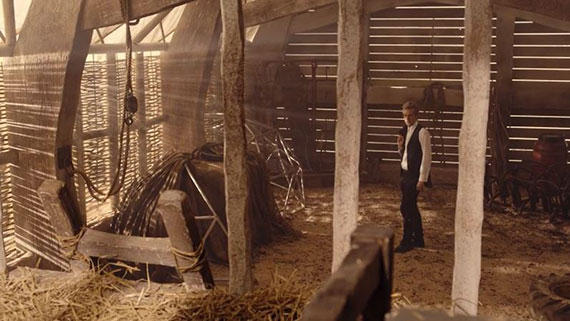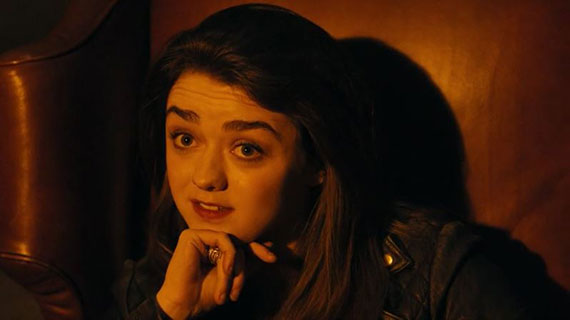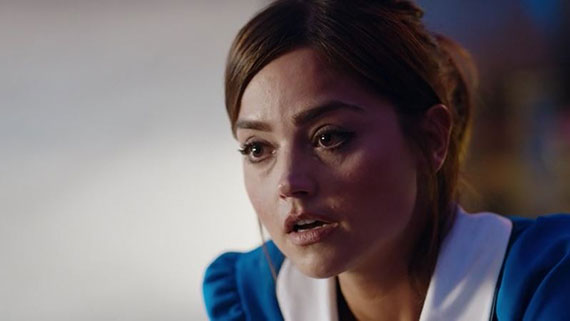Hell Bent Review (Part 1)
Clint Hassell gives his verdict on the Series 9 finale.

In crafting an exit for a companion, it is important to give the audience an opportunity to experience what made that character unique and beloved, one final time. However, in the case of Clara Oswald, the question becomes which Clara does one honor? The “impossible girl”? The one intrinsically tied to the Doctor’s history? The bossy control freak? The proto-Doctor? The rash, grieving adventurer? Clara has been different characters, sometimes literally, throughout out her storyline. “Hell Bent” works marvelously as Clara’s final story, because it manages to pay tribute to the entirety of her experience with the Doctor, while rewriting her recent death to one more befitting her character arc.
Honestly, Clara’s death in “Face the Raven” is a terrible end for the character, and would have been one of the worst exits for a companion in the history of the series. Yes, in becoming more like the Doctor, Clara had grown reckless, taking her safety for granted. However, having her soul devoured by a raven-shaped plot device sends the message that Clara’s having Doctor-like qualities is somehow a bad thing, and that her death is, in some sense, cosmic retribution for her aspiring to be something greater. That’s never been the message of Doctor Who, which has always portrayed the Doctor as a savior, hero, and explorer, and as brilliant, involved, and kind.
Where “Face the Raven” punishes Clara for not quite becoming the Doctor, “Hell Bent” is bold enough to finally utter the line Clara’s arc has built toward for three series: “Clara? Clara who?” With this twist on the titular question, Doctor Who recognizes the completion of the companions’ growth into a “Doctor,” thus making the statement that it’s not the alien biology of the Time Lord that makes him special. The Doctor is remarkable due to his character, and that can be emulated, not just by Clara, but also by the viewing audience. Whovians have known this for decades – – that the Doctor’s inspirational character is central to the series’ immense draw – – and here, the narrative blatantly admits it, too.
“Do you know why we run, Doctor?” Ashildr asks, “Because we know summer can’t last forever.” “Of course, it can,” the Doctor counters, mirroring the philosophy of the series, “Of course, it can. You just have to steal a time machine.” Note that the narrative does exactly that for Clara, outfitting her with her own TARDIS, a traveling companion, and enough immortality to explore the universe, guaranteeing that she can complete her list of 101 places to see.

Writing toward this episode’s final scenes certainly helps writer Steven Moffat, who is able to incorporate several clever clues and effective foreshadowing into his script. The teaser notes that the Doctor finds the diner in Nevada, rather than in Utah, where it was located in “The Impossible Astronaut,” a huge hint to the most observant viewers. The Doctor’s line, “Stories are where memories go when they’ve gone,” telegraphs the twist of the episode – – that the Doctor is the one whose memory has been wiped, and not Clara, as the audience expects – – while Ohila’s comment, “At the end of everything, one must expect the company of immortals” provides the episode’s best example of foreshadowing. Moffat certainly has fun playing with Ashildr’s preferred name, riffing on every use of “Me” as a pun. The Doctor is not lying when he responds to Clara’s question, “What’s out there?” with the answer, “Me.”

Building on that, “Hell Bent” is carefully constructed so that new revelations are revealed upon repeated viewing. Clara telling the Doctor, “I’d know you anywhere,” at first seems like cruel irony, coming at a point in the episode where the audience’s assumption is that Clara has forgotten the Doctor; however, upon a second viewing, the line is revealed to be an astute way Moffat heralds the episode’s end. “I don’t think I could ever forget you,” Clara tells the Doctor; sadly, she is correct.

Perhaps most impressive is that “Hell Bent” manages to follow up both the Doctor’s imprisonment, in “Heaven Sent,” and the events of the Time War, in “The Day of the Doctor,” without overshadowing Clara’s exit from the narrative. It turns out that the Doctor knows little more, if any, about the “hybrid” than any other Gallifreyan; however, he convinced the Time Lords that he did, in order to have leverage with which to barter for their assistance in rescinding Clara’s death. Saving Clara was always the main goal. Certainly, the Doctor’s emotional reaction would have felt disingenuous had he returned to Gallifrey and not dealt with the ramifications of the High Council’s involvement in the Time War. It’s to Moffat’s credit that he devotes part of the episode’s first act to that necessary housekeeping. However, the Doctor’s anger towards Rassilon is eclipsed by his greater determination to save his friend. By demonstrating that Clara has not only affected the Doctor’s history, but has also shaped his character, “Hell Bent” emphasizes how important Clara became to Doctor Who’s narrative. What better departure could a companion hope for than that?







